Tutorial Hyperledger Fabric SDK Go: How to build your first app?
This tutorial will introduce you to the Hyperledger Fabric Go SDK and allows you to build a simple application using the blockchain principle.
This tutorial uses Hyperledger Fabric version 1.0.5, on github Heroes-Service use the branch 1.0.5!
Edit: The new version of this tutorial is finished and available here: chainhero.io/2018/06/tutorial-build-blockchain-app-v1-1-0
This is the first part of this tutorial. The basics SDK features will be shown, but the second part is scheduled to demonstrate a more complex application.
- Prerequisites
- Introduction to Hyperledger Fabric
- Installation guide
- Make your first blockchain network
- Use the Fabric SDK Go
- Make this in a web application
- Referencies
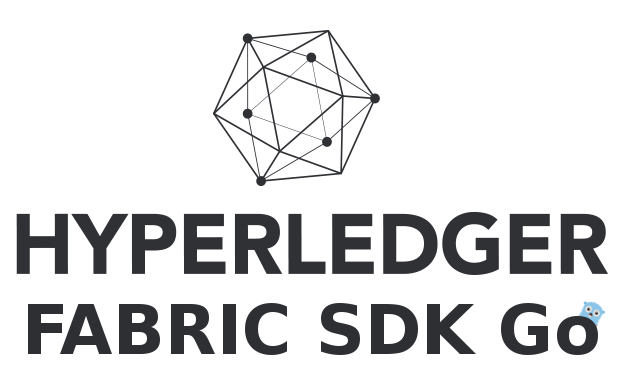
1. Prerequisites
This tutorial won’t explain in detail how Hyperledger Fabric works. I will just give some tips to understand the general behavior of the framework. If you want to get a full explanation of the tool, go to the official documentation there is a lot of work there that explains what kind of blockchain Hyperledger Fabric is.
This tutorial has been made on Ubuntu 16.04 but the Hyperledger Fabric framework is compatible with Mac OS X, Windows and other Linux distributions.
We will use the Go language to design our first application because the Hyperledger Fabric has been also built in Go and the Fabric SDK Go is really simple to use. In addition, the chaincode (smart contract) can be written in Go too. So the full-stack will be only in Go! Awesome right ? However, if you are go phobic, there are other SDK like for NodeJS, Java or Python but we won’t discuss about them here.
Hyperledger Fabric uses Docker to easily deploy a blockchain network. In addition, some components (peers) also deploys docker containers to separate data (channel). So make sure that your platform supports this kind of virtualization.
2. Introduction to Hyperledger Fabric
Hyperledger Fabric is a platform for distributed ledger solutions underpinned by a modular architecture delivering high degrees of confidentiality, resiliency, flexibility and scalability. It is designed to support pluggable implementations of different components and accommodate the complexity and intricacies that exist across the economic ecosystem.
See the full explaination from the official documentation, in the introduction part: Hyperledger Fabric Blockchain
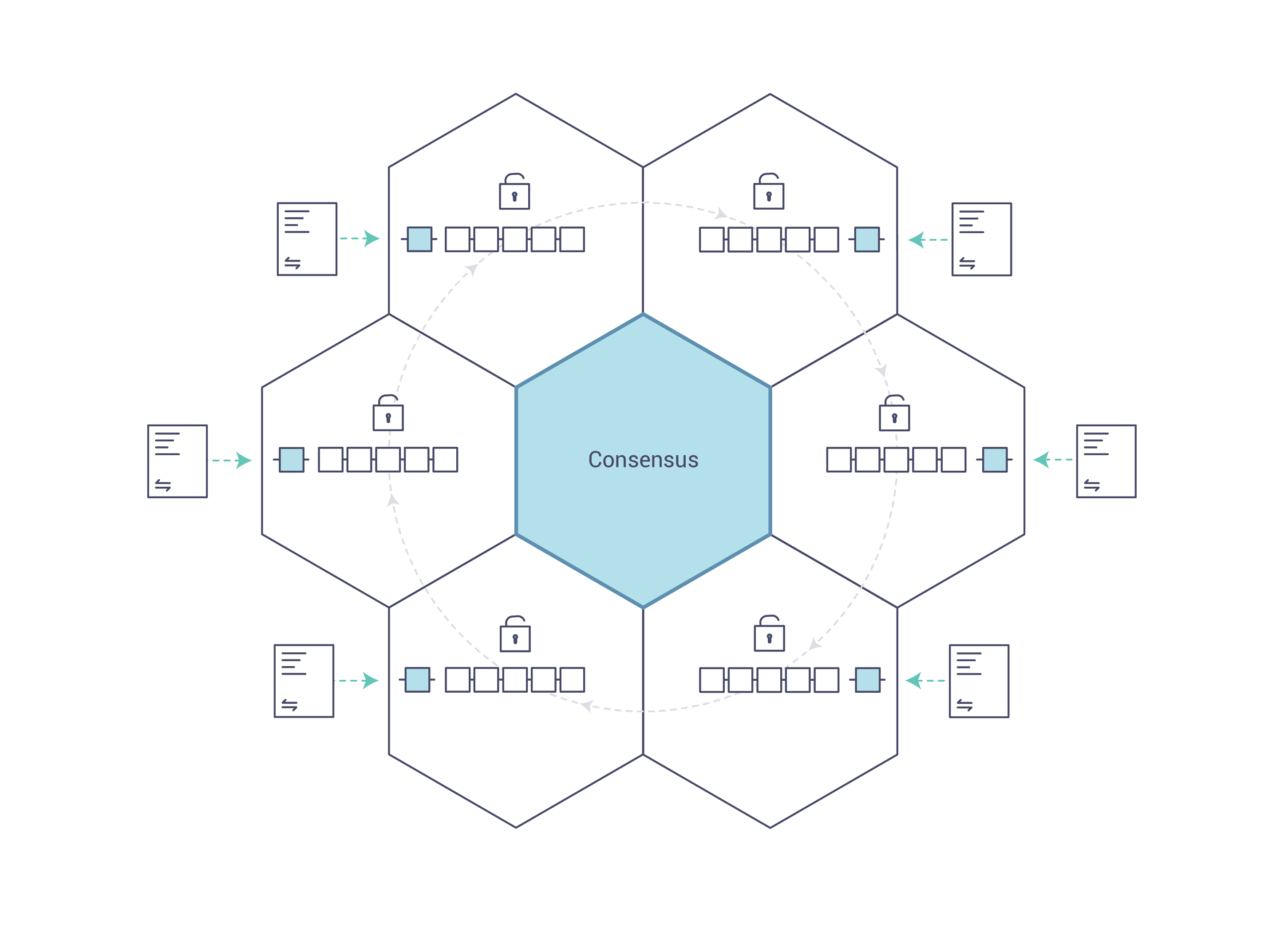
3. Installation guide
This tutorial was made on Ubuntu 16.04, but there is help for Windows, Mac OS X and other Linux distributions users.
a. Docker
Docker version 17.03.0-ce or greater is required.
Linux (Ubuntu)
First of all, in order to install docker correctly we need to install its dependencies:
sudo apt install apt-transport-https ca-certificates curl software-properties-commonOnce the dependencies are installed, we can install docker:
curl -fsSL https://download.docker.com/linux/ubuntu/gpg | sudo apt-key add - && \
sudo add-apt-repository "deb [arch=amd64] https://download.docker.com/linux/ubuntu $(lsb_release -cs) stable" && \
sudo apt update && \
sudo apt install -y docker-ce
Now we need to manage the current user to avoid using administration rights (root) access when we will use the docker command. To do so, we need to add the current user to the docker group:
sudo groupadd docker ; \
sudo gpasswd -a ${USER} docker && \
sudo service docker restartDo not mind if groupadd: group 'docker' already exists error pop up.
To apply the changes made, you need to logout/login. You can then check your version with:
docker -v
Mac OS X
Download and install the latest Docker.dmg package for Mac OS X available on the Docker website. This will install docker-compose as well, so you can skip the next step.
Linux (not Ubuntu)
See links below:
Windows
See instructions from the Docker website: docker.com/docker-for-windows
b. Docker Compose
Docker-compose version 1.8 or greater is required.
We are currently unable to manage easily multiple containers at once. To solve this issue, we need docker-compose.
Linux
The installation is pretty fast:
sudo curl -L https://github.com/docker/compose/releases/download/1.18.0/docker-compose-`uname -s`-`uname -m` -o /usr/local/bin/docker-compose && \
sudo chmod +x /usr/local/bin/docker-composeApply these changes by logout/login and then check its version with:
docker-compose version
Windows / Others
See instructions from the Docker-compose website: docs.docker.com/compose/install
c. Go
Go version 1.9.x or greater is required.
Linux
You can either follow instructions from golang.org or use these generics commands that will install Golang 1.9.2 and prepare your environment (generate your GOPATH) for Ubuntu:
wget https://storage.googleapis.com/golang/go1.9.2.linux-amd64.tar.gz && \
sudo tar -C /usr/local -xzf go1.9.2.linux-amd64.tar.gz && \
rm go1.9.2.linux-amd64.tar.gz && \
echo 'export PATH=$PATH:/usr/local/go/bin' | sudo tee -a /etc/profile && \
echo 'export GOPATH=$HOME/go' | tee -a $HOME/.bashrc && \
echo 'export PATH=$PATH:$GOROOT/bin:$GOPATH/bin' | tee -a $HOME/.bashrc && \
mkdir -p $HOME/go/{src,pkg,bin}To make sure that the installation works, you can logout/login (again) and run:
go version
Windows / Mac OS X / Others
See instructions from the Golang website: golang.org/install
d. Fabric SDK Go
Last but not least, the Hyperledger Fabric SDK Go will allow us to easily communicate with the Fabric’s components. You don’t need to install the Fabric or Fabric CA framework because the SDK automatically handles it locally. To avoid version issues, we are going to checkout to a specific commit which works with the following tutorial.
go get -u github.com/hyperledger/fabric-sdk-go && \
cd $GOPATH/src/github.com/hyperledger/fabric-sdk-go && \
git checkout 614551a752802488988921a730b172dada7def1dLet’s make sure that you have the requested dependencies:
cd $GOPATH/src/github.com/hyperledger/fabric-sdk-go && \
make depend-installFinally, we can launch the various tests of the SDK to check its proper functioning before going further:
cd $GOPATH/src/github.com/hyperledger/fabric-sdk-go ; \
makeIf you get the following error:
../fabric-sdk-go/vendor/github.com/miekg/pkcs11/pkcs11.go:29:18: fatal error: ltdl.h: No such file or directory
You need to install the package libltdl-dev and re-execute previous command (make):
sudo apt install libltdl-devThe process take a while (depending on your network connection). During this process, a virtual network has been built and some tests have been made in order to check if your system is ready. Now we can work with our first application.
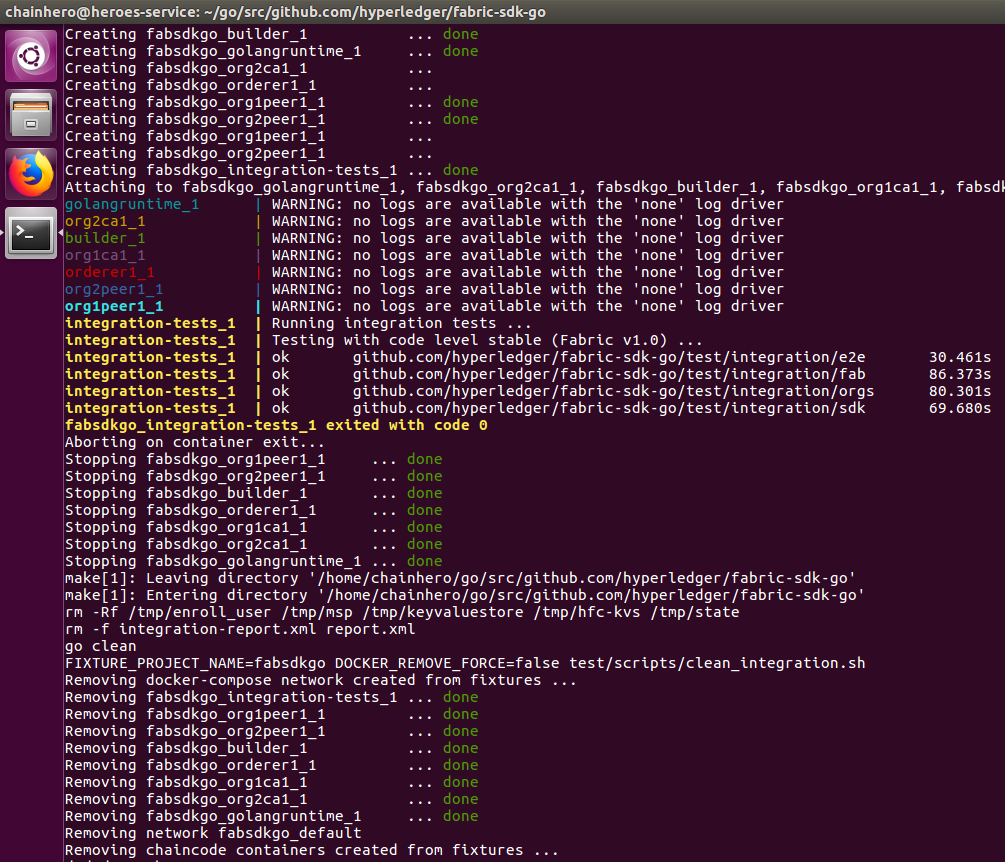
Note: there is more output but it’s irrelevant to put it here. The only things you need to care about is the line fabsdkgo_integration-tests_1 exited with code 0. If you have fabsdkgo_integration-tests_1 exited with code 1 then you have a problem. Scroll up in the messages above to find the error.
4. Make your first blockchain network
a. Prepare environment
In order to make a blockchain network, we will use docker to build virtual computers that will handle different roles. In this tutorial we will stay as simple as possible. Hyperledger Fabric needs a lot of certificates to ensure encryption during the whole end to end process (TSL, authentications, signing blocks…). The creation of these files requires a little time and in order to go straight to the heart of the matter, we have already prepared all this for you in the folder fixtures in this repository.
Make a new directory in the src folder of your GOPATH, following our repository naming:
mkdir -p $GOPATH/src/github.com/chainHero/heroes-service && \
cd $GOPATH/src/github.com/chainHero/heroes-service
To get the fixtures folder, you can either follow this command line, which will install and use subversion to get the folder from this repository. Or download the zip file from Github and extract only the fixtures folder.
sudo apt install -y subversion && \
cd $GOPATH/src/github.com/chainHero/heroes-service && \
svn checkout https://github.com/chainHero/heroes-service/branches/v1.1.0/fixtures &&
rm -rf fixtures/.svnAlternatively, if you want to know how to build this fixture folder and learn how to create the blockchain network, follow this quick tutorial on how to build your first network.
b. Test
In order to check if the network works, we will use docker-compose to start or stop all containers at the same time. Go inside the fixtures folder, and run:
cd $GOPATH/src/github.com/chainHero/heroes-service/fixtures && \
docker-compose upYou will see a lot of logs with different colors (for your information, red isn’t equal to errors).
Open a new terminal and run:
docker ps
You will see : two peers, the orderer and one CA containers. You have successfully made a new network ready to use with the SDK. To stop the network go back to the previous terminal, press Ctrl+C and wait that all containers are stopped. If you want to explore more deeper, follow our tutorial dedicated to the network part here or check out the official documentation about this: Building Your First Network
Tips: when the network is stopped, all containers used remain accessible. This is very useful to check logs for example. You can see them with docker ps -a. In order to clean up these containers, you need to delete them with docker rm $(docker ps -aq) or if you have used a docker-compose file, go where this file is and run docker-compose down
Tips: you can run the docker-compose command in background to keep the prompt. To do so, use the parameter -d, like this: docker-compose up -d. To stop containers, run in the same folder where the docker-compose.yaml is, the command: docker-compose stop (or docker-compose down to clean up after all containers are stopped).
5. Use the Fabric SDK Go
a. Configuration
Our application needs a lot of parameters, especially the addresses of the Fabric’s components to communicate. We will put everything in a new configuration file, the Fabric SDK Go configuration and our custom parameters. For the moment, we will only try to make the Fabric SDK Go works with the default chaincode:
cd $GOPATH/src/github.com/chainHero/heroes-service && \
vi config.yamlname: "chainHero-network"
# Describe what the target network is/does.
description: "The network which will host my first blockchain"
# Schema version of the content. Used by the SDK to apply the corresponding parsing rules.
version: 1.0.0
# The client section used by GO SDK.
client:
# Which organization does this application instance belong to? The value must be the name of an org
organization: Org1
logging:
level: info
# Global configuration for peer, event service and orderer timeouts
peer:
timeout:
connection: 3s
queryResponse: 45s
executeTxResponse: 30s
eventService:
timeout:
connection: 3s
registrationResponse: 3s
orderer:
timeout:
connection: 3s
response: 5s
# Root of the MSP directories with keys and certs. The Membership Service Providers is component that aims to offer an abstraction of a membership operation architecture.
cryptoconfig:
path: "${GOPATH}/src/github.com/chainHero/heroes-service/fixtures/crypto-config"
# Some SDKs support pluggable KV stores, the properties under "credentialStore" are implementation specific
credentialStore:
path: "/tmp/heroes-service-kvs"
# [Optional]. Specific to the CryptoSuite implementation used by GO SDK. Software-based implementations requiring a key store. PKCS#11 based implementations does not.
cryptoStore:
path: "/tmp/heroes-service-msp"
# BCCSP config for the client. Used by GO SDK. It's the Blockchain Cryptographic Service Provider.
# It offers the implementation of cryptographic standards and algorithms.
BCCSP:
security:
enabled: true
default:
provider: "SW"
hashAlgorithm: "SHA2"
softVerify: true
ephemeral: false
level: 256
tlsCerts:
systemCertPool: false
# [Optional]. But most apps would have this section so that channel objects can be constructed based on the content below.
# If one of your application is creating channels, you might not use this
channels:
chainhero:
orderers:
- orderer.hf.chainhero.io
# Network entity which maintains a ledger and runs chaincode containers in order to perform operations to the ledger. Peers are owned and maintained by members.
peers:
peer0.org1.hf.chainhero.io:
# [Optional]. will this peer be sent transaction proposals for endorsement? The peer must
# have the chaincode installed. The app can also use this property to decide which peers
# to send the chaincode install request. Default: true
endorsingPeer: true
# [Optional]. will this peer be sent query proposals? The peer must have the chaincode
# installed. The app can also use this property to decide which peers to send the
# chaincode install request. Default: true
chaincodeQuery: true
# [Optional]. will this peer be sent query proposals that do not require chaincodes, like
# queryBlock(), queryTransaction(), etc. Default: true
ledgerQuery: true
# [Optional]. will this peer be the target of the SDK's listener registration? All peers can
# produce events but the app typically only needs to connect to one to listen to events.
# Default: true
eventSource: true
peer1.org1.hf.chainhero.io:
# List of participating organizations in this network
organizations:
Org1:
mspid: org1.hf.chainhero.io
cryptoPath: "peerOrganizations/org1.hf.chainhero.io/users/{userName}@org1.hf.chainhero.io/msp"
peers:
- peer0.org1.hf.chainhero.io
- peer1.org1.hf.chainhero.io
certificateAuthorities:
- ca.org1.hf.chainhero.io
# List of orderers to send transaction and channel create/update requests to.
# The orderers consent on the order of transactions in a block to be committed to the ledger. For the time being only one orderer is needed.
orderers:
orderer.hf.chainhero.io:
url: grpcs://localhost:7050
grpcOptions:
ssl-target-name-override: orderer.hf.chainhero.io
grpc-max-send-message-length: 15
tlsCACerts:
path: "${GOPATH}/src/github.com/chainHero/heroes-service/fixtures/crypto-config/ordererOrganizations/hf.chainhero.io/tlsca/tlsca.hf.chainhero.io-cert.pem"
# List of peers to send various requests to, including endorsement, query and event listener registration.
peers:
peer0.org1.hf.chainhero.io:
# this URL is used to send endorsement and query requests
url: grpcs://localhost:7051
# this URL is used to connect the EventHub and registering event listeners
eventUrl: grpcs://localhost:7053
# These parameters should be set in coordination with the keepalive policy on the server
grpcOptions:
ssl-target-name-override: peer0.org1.hf.chainhero.io
grpc.http2.keepalive_time: 15
tlsCACerts:
path: "${GOPATH}/src/github.com/chainHero/heroes-service/fixtures/crypto-config/peerOrganizations/org1.hf.chainhero.io/tlsca/tlsca.org1.hf.chainhero.io-cert.pem"
peer1.org1.hf.chainhero.io:
url: grpcs://localhost:8051
eventUrl: grpcs://localhost:8053
grpcOptions:
ssl-target-name-override: peer1.org1.hf.chainhero.io
grpc.http2.keepalive_time: 15
tlsCACerts:
# Certificate location absolute path
path: "${GOPATH}/src/github.com/chainHero/heroes-service/fixtures/crypto-config/peerOrganizations/org1.hf.chainhero.io/tlsca/tlsca.org1.hf.chainhero.io-cert.pem"
# Fabric-CA is a special kind of Certificate Authority provided by Hyperledger Fabric which allows certificate management to be done via REST APIs.
certificateAuthorities:
ca.org1.hf.chainhero.io:
url: https://localhost:7054
# the properties specified under this object are passed to the 'http' client verbatim when making the request to the Fabric-CA server
httpOptions:
verify: false
registrar:
enrollId: admin
enrollSecret: adminpw
caName: ca.org1.hf.chainhero.io
The configuration file is also available here: config.yaml
b. Initialise
We add a new folder named blockchain that will contain the whole interface that communicate with the network. We will see the Fabric SDK Go only in this folder.
mkdir $GOPATH/src/github.com/chainHero/heroes-service/blockchain
Now, we add a new go file named setup.go:
vi $GOPATH/src/github.com/chainHero/heroes-service/blockchain/setup.gopackage blockchain
import (
"fmt"
chmgmt "github.com/hyperledger/fabric-sdk-go/api/apitxn/chmgmtclient"
resmgmt "github.com/hyperledger/fabric-sdk-go/api/apitxn/resmgmtclient"
"github.com/hyperledger/fabric-sdk-go/pkg/config"
"github.com/hyperledger/fabric-sdk-go/pkg/fabsdk"
"time"
)
// FabricSetup implementation
type FabricSetup struct {
ConfigFile string
ChannelID string
initialized bool
ChannelConfig string
OrgAdmin string
OrgName string
admin resmgmt.ResourceMgmtClient
sdk *fabsdk.FabricSDK
}
// Initialize reads the configuration file and sets up the client, chain and event hub
func (setup *FabricSetup) Initialize() error {
// Add parameters for the initialization
if setup.initialized {
return fmt.Errorf("sdk already initialized")
}
// Initialize the SDK with the configuration file
sdk, err := fabsdk.New(config.FromFile(setup.ConfigFile))
if err != nil {
return fmt.Errorf("failed to create sdk: %v", err)
}
setup.sdk = sdk
// Channel management client is responsible for managing channels (create/update channel)
// Supply user that has privileges to create channel (in this case orderer admin)
chMgmtClient, err := setup.sdk.NewClient(fabsdk.WithUser(setup.OrgAdmin), fabsdk.WithOrg(setup.OrgName)).ChannelMgmt()
if err != nil {
return fmt.Errorf("failed to add Admin user to sdk: %v", err)
}
// Org admin user is signing user for creating channel.
// The session method is the only way for now to get the user identity.
session, err := setup.sdk.NewClient(fabsdk.WithUser(setup.OrgAdmin), fabsdk.WithOrg(setup.OrgName)).Session()
if err != nil {
return fmt.Errorf("failed to get session for %s, %s: %s", setup.OrgName, setup.OrgAdmin, err)
}
orgAdminUser := session
// Creation of the channel chainhero. A channel can be understood as a private network inside the main network between two or more specific network Organizations
// The channel is defined by its : Organizations, anchor peer (A peer node that all other peers can discover and communicate with. Every Organizations have one), the shared ledger, chaincode application(s) and the ordering service node(s)
// Each transaction on the network is executed on a channel.
req := chmgmt.SaveChannelRequest{ChannelID: setup.ChannelID, ChannelConfig: setup.ChannelConfig, SigningIdentity: orgAdminUser}
if err = chMgmtClient.SaveChannel(req); err != nil {
return fmt.Errorf("failed to create channel: %v", err)
}
// Allow orderer to process channel creation
time.Sleep(time.Second * 5)
// The resource management client is a client API for managing system resources
// It will allow us to directly interact with the blockchain. It can be associated with the admin status
setup.admin, err = setup.sdk.NewClient(fabsdk.WithUser(setup.OrgAdmin)).ResourceMgmt()
if err != nil {
return fmt.Errorf("failed to create new resource management client: %v", err)
}
// Org peers join channel
if err = setup.admin.JoinChannel(setup.ChannelID); err != nil {
return fmt.Errorf("org peers failed to join the channel: %v", err)
}
fmt.Println("Initialization Successful")
setup.initialized = true
return nil
}The file is available here: blockchain/setup.go
At this stage, we only initialized a client that will communicate to a peer, a CA and an orderer. We also made a new channel and connected this peer to this channel. See the comments in the code for more information.
c. Test
To make sure that the client managed to initialize all his components, we will make a simple test with the network launched. In order to do this, we need to build the go code. Since we haven’t any main file we have to add one:
cd $GOPATH/src/github.com/chainHero/heroes-service && \
vi main.gopackage main
import (
"fmt"
"github.com/chainHero/heroes-service/blockchain"
"os"
)
func main() {
// Definition of the Fabric SDK properties
fSetup := blockchain.FabricSetup{
OrgAdmin: "Admin",
OrgName: "Org1",
ConfigFile: "config.yaml",
// Channel parameters
ChannelID: "chainhero",
ChannelConfig: os.Getenv("GOPATH") + "/src/github.com/chainHero/heroes-service/fixtures/artifacts/chainhero.channel.tx",
}
// Initialization of the Fabric SDK from the previously set properties
err := fSetup.Initialize()
if err != nil {
fmt.Printf("Unable to initialize the Fabric SDK: %v\n", err)
}
}The file is available here: main.go
As you can see, we fixed the GOPATH of the environment if it’s not set. We will need this feature in order to compile the chaincode (we will see this in the next step).
The last thing to do, before starting the compilation, is to use a vendor directory that will contain all our dependencies. In our GOPATH we have Fabric SDK Go and maybe other projects. When we will try to compile our app, Golang search dependencies in our GOPATH, but first it checks if there is a vendor folder in the project. If the dependency is satisfied, then Golang doesn’t go looking in GOPATH or GOROOT. This is very useful when using several different versions of a dependency (some conflicts can happen, like multiple definitions of BCCSP in our case). We will handle this by using a tool like dep to flatten these dependencies in the vendor directory.
When you installed the SDK dependencies, DEP was automatically installed. If this is not the case, you can install it by reading the instructions available here: dep installation
Create a file called Gopkg.toml and copy this inside:
cd $GOPATH/src/github.com/chainHero/heroes-service && \
vi Gopkg.toml[[constraint]]
# v1.0.5
name = "github.com/hyperledger/fabric"
revision = "014d6befcf67f3787bb3d67ff34e1a98dc6aec5f"
[[constraint]]
name = "github.com/hyperledger/fabric-sdk-go"
revision = "614551a752802488988921a730b172dada7def1d"This is a constraint for dep in order to specify that in our vendor we want the SDK Go to a specific version.
Save the file and then execute this command to synchronize the vendor directory with our project’s dependencies (this may take a while to proceed):
cd $GOPATH/src/github.com/chainHero/heroes-service && \
dep ensureNow we can compile our application:
cd $GOPATH/src/github.com/chainHero/heroes-service && \
go build
After some time, a new binary named heroes-service will appear at the root of the project. Try to start the binary like this:
cd $GOPATH/src/github.com/chainHero/heroes-service && \
./heroes-service
At this point, it won’t work because there is no network deployed that the SDK can talk with. We will first start the network and then launch the app again:
cd $GOPATH/src/github.com/chainHero/heroes-service/fixtures && \
docker-compose up -d && \
cd .. && \
./heroes-service
Note: you need to see “Initialization Successful”. If it’s not the case then something went wrong.
Alright! So we just initialised the SDK with our local network. In the next step, we will interact with a chaincode.
d. Clean up and Makefile
The Fabric SDK generates some files, like certificates, binaries and temporally files. Shutting down the network won’t fully clean up your environment and when you will need to start it again, these files will be reused to avoid building process. For development you can keep them to test quickly but for a real test, you need to clean up all and start from the beginning.
How clean up my environment ?
-
Shut down your network:
cd $GOPATH/src/github.com/chainhero-website/heroes-service/fixtures && docker-compose down -
Remove credential stores (defined in the config file, in the
client.credentialStoresection):rm -rf /tmp/heroes-service-* -
Remove some docker containers and docker images not generated by the
docker-composecommand:docker rm -f -v `docker ps -a --no-trunc | grep "heroes-service" | cut -d ' ' -f 1` 2>/dev/null and docker rmi `docker images --no-trunc | grep "heroes-service" | cut -d ' ' -f 1` 2>/dev/null
How to be more efficient ?
We can automatize all these tasks in one single step. Also the build and start process can be automated. To do so, we will create a Makefile. First, ensure that you have the tool:
make --version
If make is not installed do (Ubuntu):
sudo apt install make
Then create a file named Makefile at the root of the project with this content:
cd $GOPATH/src/github.com/chainHero/heroes-service && \
vi Makefile
.PHONY: all dev clean build env-up env-down run
all: clean build env-up run
dev: build run
##### BUILD
build:
@echo "Build ..."
@dep ensure
@go build
@echo "Build done"
##### ENV
env-up:
@echo "Start environment ..."
@cd fixtures && docker-compose up --force-recreate -d
@echo "Sleep 15 seconds in order to let the environment setup correctly"
@sleep 15
@echo "Environment up"
env-down:
@echo "Stop environment ..."
@cd fixtures && docker-compose down
@echo "Environment down"
##### RUN
run:
@echo "Start app ..."
@./heroes-service
##### CLEAN
clean: env-down
@echo "Clean up ..."
@rm -rf /tmp/heroes-service-* heroes-service
@docker rm -f -v `docker ps -a --no-trunc | grep "heroes-service" | cut -d ' ' -f 1` 2>/dev/null || true
@docker rmi `docker images --no-trunc | grep "heroes-service" | cut -d ' ' -f 1` 2>/dev/null || true
@echo "Clean up done"
The file is available here: Makefile
Now with the task all:
- the whole environment will be cleaned up,
- then our go program will be compiled,
- after which the network will be deployed and
- finally the app will be up and running.
To use it, go in the root of the project and use the make command:
-
Task
all:makeormake all -
Task
clean: clean up everything and put down the network (make clean) -
Task
build: just build the application (make build) -
Task
env-up: just make the network up (make env-up) - ...
e. Install & instantiate the chaincode
We are almost there to use the blockchain system. But for now we haven’t set up any chaincode (smart contract) yet that will handle queries from our application. First, let’s create a new directory named chaincode and add a new file named main.go (this is the main entry point of our smart-contract):
cd $GOPATH/src/github.com/chainHero/heroes-service && \
mkdir chaincode && \
vi chaincode/main.gopackage main
import (
"fmt"
"github.com/hyperledger/fabric/core/chaincode/shim"
pb "github.com/hyperledger/fabric/protos/peer"
)
// HeroesServiceChaincode implementation of Chaincode
type HeroesServiceChaincode struct {
}
// Init of the chaincode
// This function is called only one when the chaincode is instantiated.
// So the goal is to prepare the ledger to handle future requests.
func (t *HeroesServiceChaincode) Init(stub shim.ChaincodeStubInterface) pb.Response {
fmt.Println("########### HeroesServiceChaincode Init ###########")
// Get the function and arguments from the request
function, _ := stub.GetFunctionAndParameters()
// Check if the request is the init function
if function != "init" {
return shim.Error("Unknown function call")
}
// Put in the ledger the key/value hello/world
err := stub.PutState("hello", []byte("world"))
if err != nil {
return shim.Error(err.Error())
}
// Return a successful message
return shim.Success(nil)
}
// Invoke
// All future requests named invoke will arrive here.
func (t *HeroesServiceChaincode) Invoke(stub shim.ChaincodeStubInterface) pb.Response {
fmt.Println("########### HeroesServiceChaincode Invoke ###########")
// Get the function and arguments from the request
function, args := stub.GetFunctionAndParameters()
// Check whether it is an invoke request
if function != "invoke" {
return shim.Error("Unknown function call")
}
// Check whether the number of arguments is sufficient
if len(args) < 1 {
return shim.Error("The number of arguments is insufficient.")
}
// In order to manage multiple type of request, we will check the first argument.
// Here we have one possible argument: query (every query request will read in the ledger without modification)
if args[0] == "query" {
return t.query(stub, args)
}
return shim.Error("Unknown action, check the first argument")
}
// query
// Every readonly functions in the ledger will be here
func (t *HeroesServiceChaincode) query(stub shim.ChaincodeStubInterface, args []string) pb.Response {
fmt.Println("########### HeroesServiceChaincode query ###########")
// Check whether the number of arguments is sufficient
if len(args) < 2 {
return shim.Error("The number of arguments is insufficient.")
}
// Like the Invoke function, we manage multiple type of query requests with the second argument.
// We also have only one possible argument: hello
if args[1] == "hello" {
// Get the state of the value matching the key hello in the ledger
state, err := stub.GetState("hello")
if err != nil {
return shim.Error("Failed to get state of hello")
}
// Return this value in response
return shim.Success(state)
}
// If the arguments given don’t match any function, we return an error
return shim.Error("Unknown query action, check the second argument.")
}
func main() {
// Start the chaincode and make it ready for futures requests
err := shim.Start(new(HeroesServiceChaincode))
if err != nil {
fmt.Printf("Error starting Heroes Service chaincode: %s", err)
}
}The file is available here: chaincode/main.go
Note: the chaincode isn’t really related to the application, we can have one repository for the app and another for the chaincode. For your information, today the chaincode can also be written in other languages like Java.
For now, the chaincode does nothing extraordinary, just put the key/value hello/world in the ledger at initialisation. In addition, there is one function that we can call by an invoke: query hello. This function gets the state of the ledger, i.e. hello and give it in response. We will test this in the next step, after successfully install and instantiate the chaincode.
In order to install and instantiate the chaincode, we need to add some code in the application. Edit the blockchain/setup.go with those following lines:
package blockchain
import (
"fmt"
"github.com/hyperledger/fabric-sdk-go/api/apitxn/chclient"
chmgmt "github.com/hyperledger/fabric-sdk-go/api/apitxn/chmgmtclient"
resmgmt "github.com/hyperledger/fabric-sdk-go/api/apitxn/resmgmtclient"
"github.com/hyperledger/fabric-sdk-go/pkg/config"
packager "github.com/hyperledger/fabric-sdk-go/pkg/fabric-client/ccpackager/gopackager"
"github.com/hyperledger/fabric-sdk-go/pkg/fabsdk"
"github.com/hyperledger/fabric-sdk-go/third_party/github.com/hyperledger/fabric/common/cauthdsl"
"time"
)
// FabricSetup implementation
type FabricSetup struct {
ConfigFile string
OrgID string
ChannelID string
ChainCodeID string
initialized bool
ChannelConfig string
ChaincodeGoPath string
ChaincodePath string
OrgAdmin string
OrgName string
UserName string
client chclient.ChannelClient
admin resmgmt.ResourceMgmtClient
sdk *fabsdk.FabricSDK
}
// Initialize reads the configuration file and sets up the client, chain and event hub
func (setup *FabricSetup) Initialize() error {
[...]
}
func (setup *FabricSetup) InstallAndInstantiateCC() error {
// Create a new go lang chaincode package and initializing it with our chaincode
ccPkg, err := packager.NewCCPackage(setup.ChaincodePath, setup.ChaincodeGoPath)
if err != nil {
return fmt.Errorf("failed to create chaincode package: %v", err)
}
// Install our chaincode on org peers
// The resource management client send the chaincode to all peers in its channel in order for them to store it and interact with it later
installCCReq := resmgmt.InstallCCRequest{Name: setup.ChainCodeID, Path: setup.ChaincodePath, Version: "1.0", Package: ccPkg}
_, err = setup.admin.InstallCC(installCCReq)
if err != nil {
return fmt.Errorf("failed to install cc to org peers %v", err)
}
// Set up chaincode policy
// The chaincode policy is required if your transactions must follow some specific rules
// If you don't provide any policy every transaction will be endorsed, and it's probably not what you want
// In this case, we set the rule to : Endorse the transaction if the transaction have been signed by a member from the org "org1.hf.chainhero.io"
ccPolicy := cauthdsl.SignedByAnyMember([]string{"org1.hf.chainhero.io"})
// Instantiate our chaincode on org peers
// The resource management client tells to all peers in its channel to instantiate the chaincode previously installed
err = setup.admin.InstantiateCC(setup.ChannelID, resmgmt.InstantiateCCRequest{Name: setup.ChainCodeID, Path: setup.ChaincodePath, Version: "1.0", Args: [][]byte{[]byte("init")}, Policy: ccPolicy})
if err != nil {
return fmt.Errorf("failed to instantiate the chaincode: %v", err)
}
// Channel client is used to query and execute transactions
setup.client, err = setup.sdk.NewClient(fabsdk.WithUser(setup.UserName)).Channel(setup.ChannelID)
if err != nil {
return fmt.Errorf("failed to create new channel client: %v", err)
}
fmt.Println("Chaincode Installation & Instantiation Successful")
return nil
}The file is available here: blockchain/setup.go
Tips: take care of the chaincode version, if you want to update your chaincode, increment the version number set at the lines 103 and 113 of this setup.go file. Otherwise the network will keep the same chaincode.
We need now to modify our main.go file in order to call our new function
cd $GOPATH/src/github.com/chainHero/heroes-service && \
vi main.go[...]
fSetup := blockchain.FabricSetup{
// Channel parameters
ChannelID: "chainhero",
ChannelConfig: os.Getenv("GOPATH") + "/src/github.com/chainHero/heroes-service/fixtures/artifacts/chainhero.channel.tx",
// Chaincode parameters
ChainCodeID: "heroes-service",
ChaincodeGoPath: os.Getenv("GOPATH"),
ChaincodePath: "github.com/chainHero/heroes-service/chaincode/",
OrgAdmin: "Admin",
OrgName: "Org1",
ConfigFile: "config.yaml",
// User parameters
UserName: "User1",
}
[...]
// Install and instantiate the chaincode
err = fSetup.InstallAndInstantiateCC()
if err != nil {
fmt.Printf("Unable to install and instantiate the chaincode: %v\n", err)
}
}The file is available here: main.go
We can test this, just with the make command setup in the previous step:
cd $GOPATH/src/github.com/chainHero/heroes-service && \
make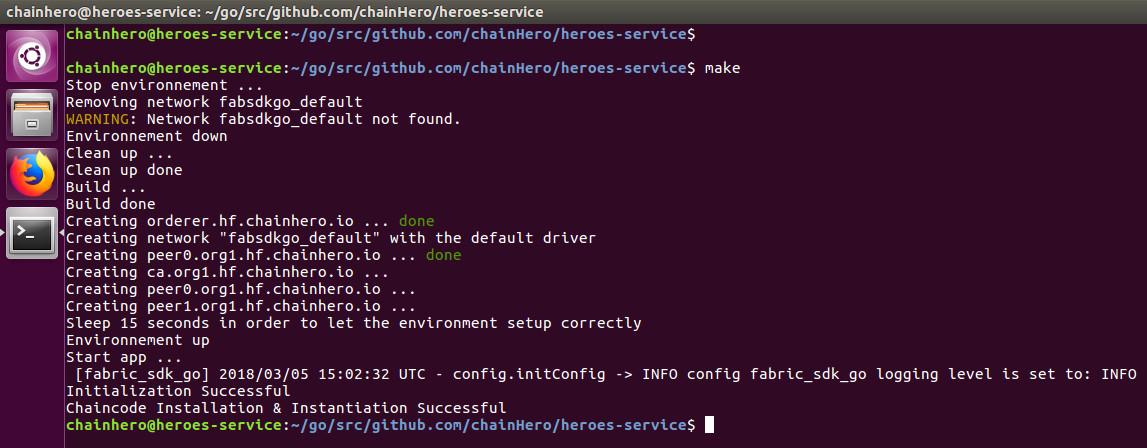
Tips: the installation and the instantiation don’t need to be run at every start of the application. Only when we update the chaincode (and the chaincode version). A solution is to provide an argument when we run the application to tell to do this additional procedure before move on. Since in this tutorial we will clean up the environment every time we don’t really care about that.
f. Query the chaincode
Like a database, the chaincode is plugged and ready to answer. Let’s try the hello query.
We will put all query functions in a new file named query.go in the blockchain folder:
cd $GOPATH/src/github.com/chainHero/heroes-service && \
vi blockchain/query.gopackage blockchain
import (
"fmt"
"github.com/hyperledger/fabric-sdk-go/api/apitxn/chclient"
)
// QueryHello query the chaincode to get the state of hello
func (setup *FabricSetup) QueryHello() (string, error) {
// Prepare arguments
var args []string
args = append(args, "invoke")
args = append(args, "query")
args = append(args, "hello")
response, err := setup.client.Query(chclient.Request{ChaincodeID: setup.ChainCodeID, Fcn: args[0], Args: [][]byte{[]byte(args[1]), []byte(args[2])}})
if err != nil {
return "", fmt.Errorf("failed to query: %v", err)
}
return string(response.Payload), nil
}The file is available here: blockchain/query.go
You can add the call to this new function in the main.go:
cd $GOPATH/src/github.com/chainHero/heroes-service && \
vi main.gofunc main() {
[...]
// Query the chaincode
response, err := fSetup.QueryHello()
if err != nil {
fmt.Printf("Unable to query hello on the chaincode: %v\n", err)
} else {
fmt.Printf("Response from the query hello: %s\n", response)
}
}The file is available here: main.go
Let’s try:
cd $GOPATH/src/github.com/chainHero/heroes-service && \
make
g. Change the ledger state
The next thing to do in order to make a basic tour of the Fabric SDK Go, is to make a request to the chaincode in order to change the ledger state.
First, we will add this ability in the chaincode. Edit the chaincode/main.go file:
[...]
// Invoke
// All future requests named invoke will arrive here.
func (t *HeroesServiceChaincode) Invoke(stub shim.ChaincodeStubInterface) pb.Response {
fmt.Println("########### HeroesServiceChaincode Invoke ###########")
// Get the function and arguments from the request
function, args := stub.GetFunctionAndParameters()
// Check whether it is an invoke request
if function != "invoke" {
return shim.Error("Unknown function call")
}
// Check whether the number of arguments is sufficient
if len(args) < 1 {
return shim.Error("The number of arguments is insufficient.")
}
// In order to manage multiple type of request, we will check the first argument.
// Here we have one possible argument: query (every query request will read in the ledger without modification)
if args[0] == "query" {
return t.query(stub, args)
}
// The update argument will manage all update in the ledger
if args[0] == "invoke" {
return t.invoke(stub, args)
}
// If the arguments given don’t match any function, we return an error
return shim.Error("Unknown action, check the first argument")
}
[...]
// invoke
// Every functions that read and write in the ledger will be here
func (t *HeroesServiceChaincode) invoke(stub shim.ChaincodeStubInterface, args []string) pb.Response {
fmt.Println("########### HeroesServiceChaincode invoke ###########")
if len(args) < 2 {
return shim.Error("The number of arguments is insufficient.")
}
// Check if the ledger key is "hello" and process if it is the case. Otherwise it returns an error.
if args[1] == "hello" && len(args) == 3 {
// Write the new value in the ledger
err := stub.PutState("hello", []byte(args[2]))
if err != nil {
return shim.Error("Failed to update state of hello")
}
// Notify listeners that an event "eventInvoke" have been executed (check line 19 in the file invoke.go)
err = stub.SetEvent("eventInvoke", []byte{})
if err != nil {
return shim.Error(err.Error())
}
// Return this value in response
return shim.Success(nil)
}
// If the arguments given don’t match any function, we return an error
return shim.Error("Unknown invoke action, check the second argument.")
}
[...]The file is available here: chaincode/main.go
From the application side, we add a new function to make the invocation of the chaincode. Add a file named invoke.go in the blockchain folder:
cd $GOPATH/src/github.com/chainHero/heroes-service && \
vi blockchain/invoke.gopackage blockchain
import (
"fmt"
"github.com/hyperledger/fabric-sdk-go/api/apitxn/chclient"
"time"
)
// InvokeHello
func (setup *FabricSetup) InvokeHello(value string) (string, error) {
// Prepare arguments
var args []string
args = append(args, "invoke")
args = append(args, "invoke")
args = append(args, "hello")
args = append(args, value)
eventID := "eventInvoke"
// Add data that will be visible in the proposal, like a description of the invoke request
transientDataMap := make(map[string][]byte)
transientDataMap["result"] = []byte("Transient data in hello invoke")
// Register a notification handler on the client
notifier := make(chan *chclient.CCEvent)
rce, err := setup.client.RegisterChaincodeEvent(notifier, setup.ChainCodeID, eventID)
if err != nil {
return "", fmt.Errorf("failed to register chaincode evet: %v", err)
}
// Create a request (proposal) and send it
response, err := setup.client.Execute(chclient.Request{ChaincodeID: setup.ChainCodeID, Fcn: args[0], Args: [][]byte{[]byte(args[1]), []byte(args[2]), []byte(args[3])}, TransientMap: transientDataMap})
if err != nil {
return "", fmt.Errorf("failed to move funds: %v", err)
}
// Wait for the result of the submission
select {
case ccEvent := <-notifier:
fmt.Printf("Received CC event: %s\n", ccEvent)
case <-time.After(time.Second * 20):
return "", fmt.Errorf("did NOT receive CC event for eventId(%s)", eventID)
}
// Unregister the notification handler previously created on the client
err = setup.client.UnregisterChaincodeEvent(rce)
return response.TransactionID.ID, nil
}The file is available here: blockchain/invoke.go
You can then add the call to this function in the main.go:
cd $GOPATH/src/github.com/chainHero/heroes-service && \
vi main.gofunc main() {
[...]
// Query the chaincode
response, err := fSetup.QueryHello()
if err != nil {
fmt.Printf("Unable to query hello on the chaincode: %v\n", err)
} else {
fmt.Printf("Response from the query hello: %s\n", response)
}
// Invoke the chaincode
txId, err := fSetup.InvokeHello("chainHero")
if err != nil {
fmt.Printf("Unable to invoke hello on the chaincode: %v\n", err)
} else {
fmt.Printf("Successfully invoke hello, transaction ID: %s\n", txId)
}
// Query again the chaincode
response, err = fSetup.QueryHello()
if err != nil {
fmt.Printf("Unable to query hello on the chaincode: %v\n", err)
} else {
fmt.Printf("Response from the query hello: %s\n", response)
}
}The file is available here: main.go
Let’s try:
cd $GOPATH/src/github.com/chainHero/heroes-service && \
make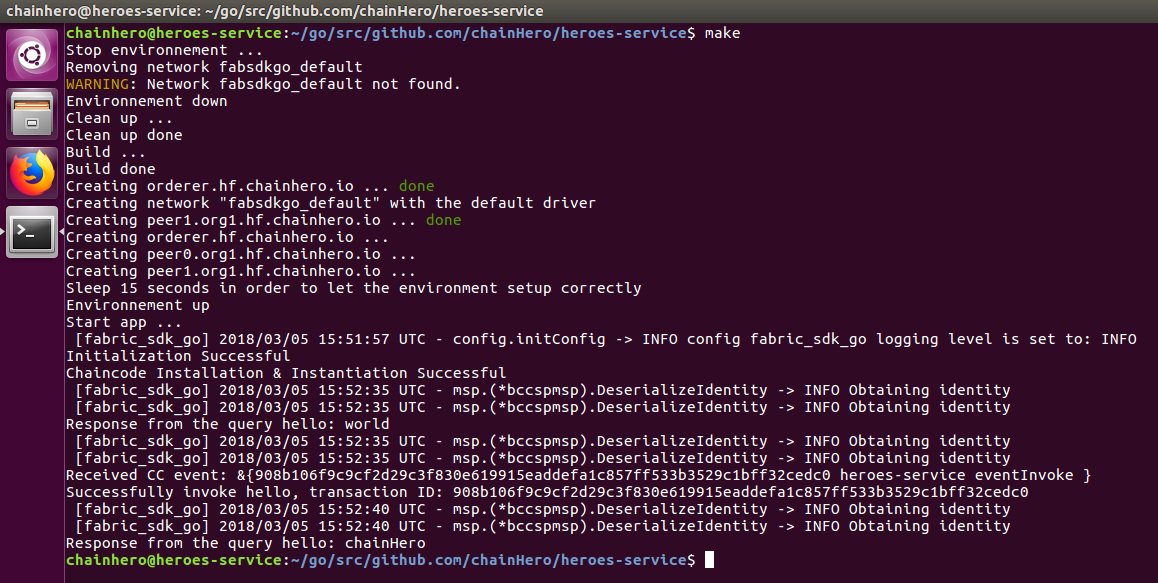
Note: this error message may appear: endorsement validation failed: Endorser Client Status Code: (3) ENDORSEMENT_MISMATCH. Description: ProposalResponsePayloads do not match. Since we have two peers, the SDK sends its request to the two directly and if it receives a different answer (which is quite possible because it’s an asynchronous system) then it returns this error. The best thing to do in these cases is to start over again.
6. Make this in a web application
We also can make this usable for any user. The best choice is a web application and we are lucky because the Go language natively provides a web server handling HTTP requests and also templating for HTML.
For now, we have only two different actions: the query and the invocation of the hello value. Let’s make two HTML pages for each action. We add a web directory with three other directories:
-
web/templates: contains all HTML pages (templates) -
web/assets: contains all CSS, Javascript, Fonts, Images… -
web/controllers: contains all functions that will render templates
We use the MVC (Model-View-Controller) to make it more readable. The Model will be the blockchain part, the View are templates and Controller are provided by functions in the controllers directory.
Populate each with the appropriate code (we also added Bootstrap to make the result a little prettier):
-
web/templates/layout.html -
web/templates/home.html -
web/templates/request.html -
web/controllers/controller.go -
web/controllers/home.go -
web/controllers/request.go -
web/app.go -
web/assets
And finally, we change the main.go, in order to use the web interface instead of directly query the blockchain.
Run the app and go to localhost:3000/home.html:
cd $GOPATH/src/github.com/chainHero/heroes-service ; \
make
The home page make a query in the blockchain to get the value of the hello key and display it.

The request page has a form to change the hello value.
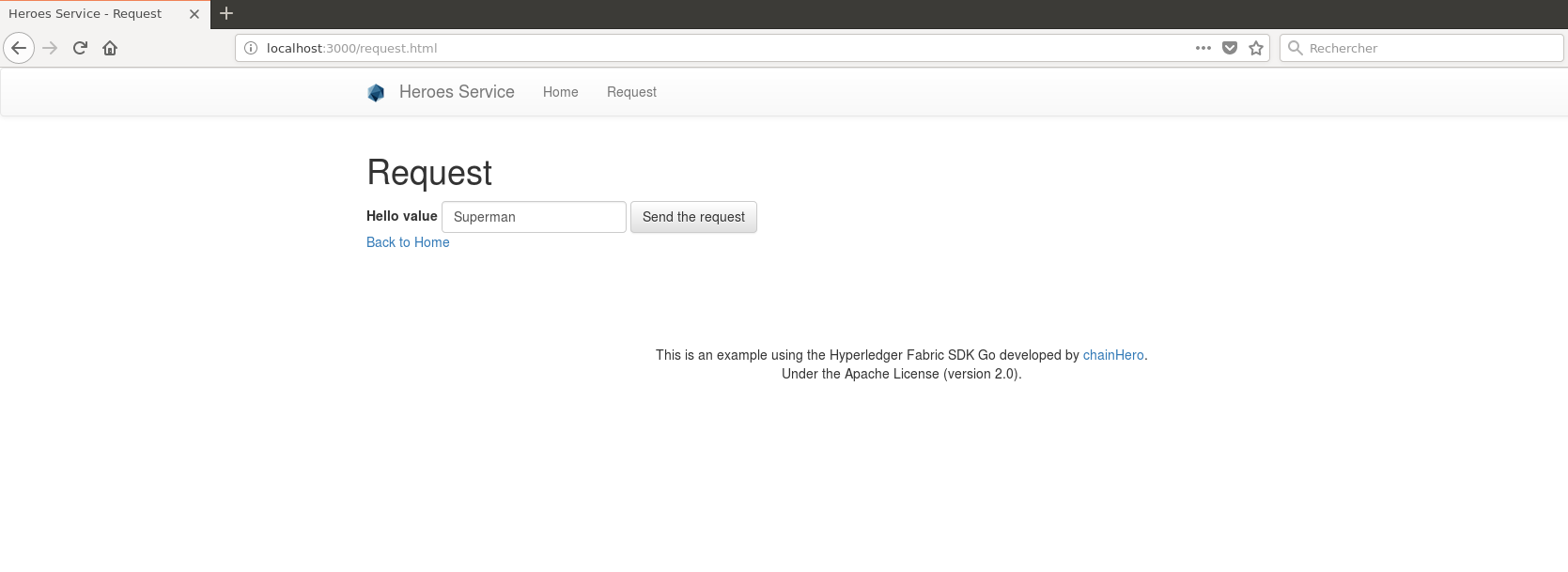
After a successful submission the transaction ID is given.
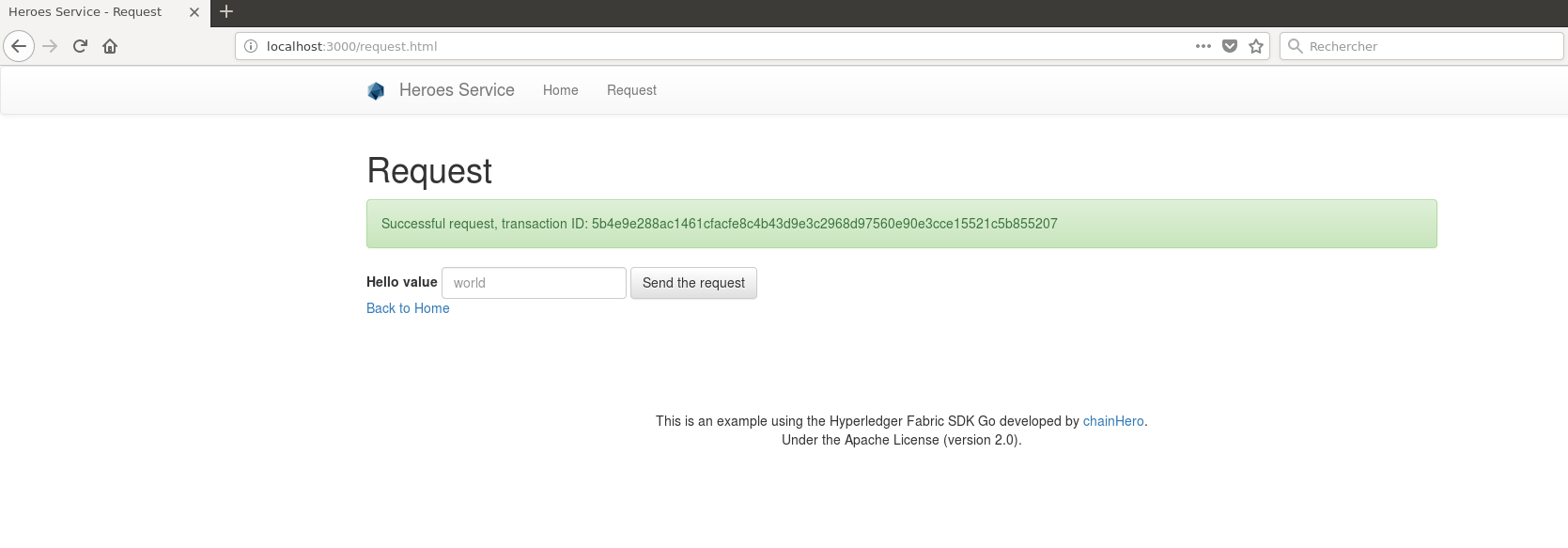
We can see the change by going back to the home page.
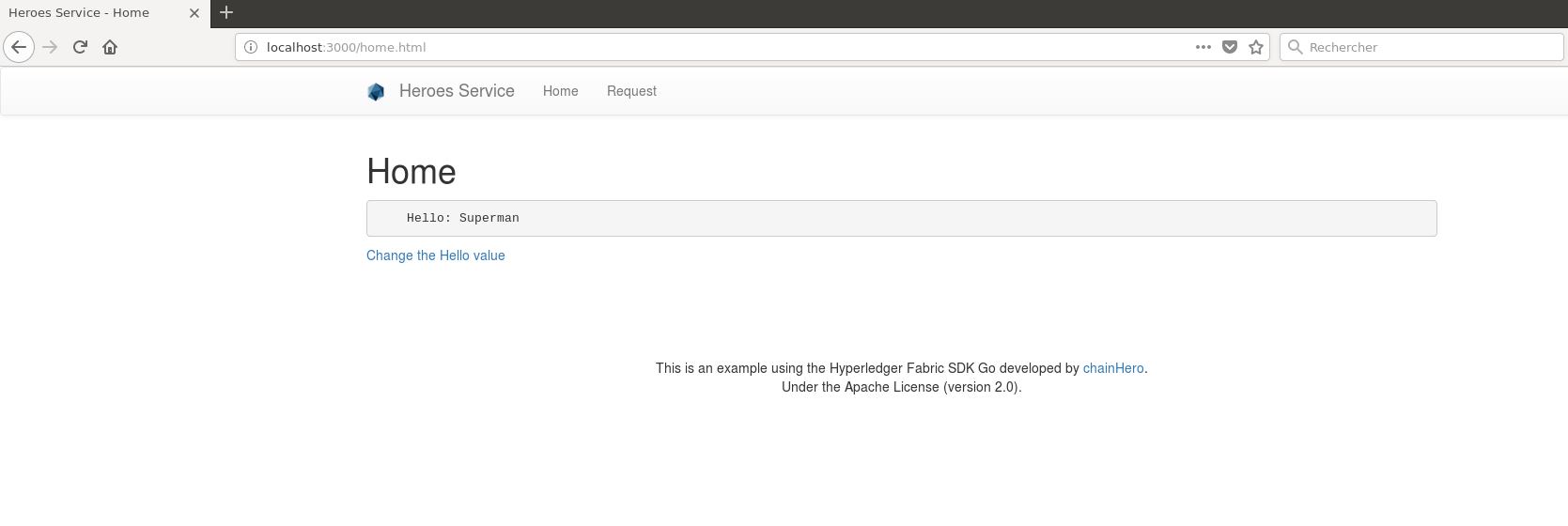
It’s the end for the first part. A more complex application is coming.
7. Referencies
- Hyperledger website
- Hyperledger Fabric online documentation
- Hyperledger Fabric on github
- Hyperledger Fabric Certificate Authority on github
- Hyperledger Fabric SDK Go on github
- Fabric SDK Go tests
- CLI: An example CLI for Fabric built with the Go SDK.

